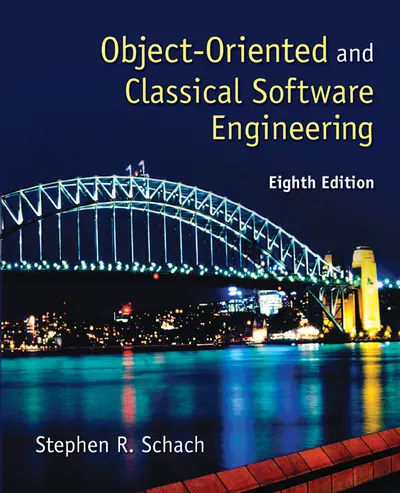My Account Details

ISBN10: 0073376183 | ISBN13: 9780073376189

* The estimated amount of time this product will be on the market is based on a number of factors, including faculty input to instructional design and the prior revision cycle and updates to academic research-which typically results in a revision cycle ranging from every two to four years for this product. Pricing subject to change at any time.
Instructor Information
Quick Actions (Only for Validated Instructor Accounts):
Building on seven strong editions, the eighth edition maintains the organization and approach for which Object-Oriented and Classical Software Engineering is known while making significant improvements and additions to content as well as problems and projects. The revisions for the eighth edition make the text easier to use in a one-semester course.
Integrating case studies to show the object oriented approach to software engineering, Object-Oriented and Classical Software Engineering, 8/e presents an excellent introduction to software engineering fundamentals, covering both traditional and object-oriented techniques.
While maintaining a unique organization with Part I covering underlying software engineering theory, and Part II presenting the more practical life cycle, the eighth edition includes significant revision to problems, new content, as well as a new chapter to enable instructors to better-utilize the book in a one-semester course. Complementing this well-balanced approach is the straightforward, student-friendly writing style, through which difficult concepts are presented in a clear, understandable manner.
Part I: Introduction to Software EngineeringChapter 1: The Scope of Software EngineeringChapter 2: Software Life-Cycle ModelsChapter 3: The Software ProcessChapter 4: TeamsChapter 5: The Tools of the TradeChapter 6: TestingChapter 7: From Modules to ObjectsChapter 8: Reusability and PortabilityChapter 9: Planning and EstimatingPart II: The Workflows of the Software Life CycleChapter 10: Key Material from Part AChapter 11: RequirementsChapter 12: Classical AnalysisChapter 13: Object-Oriented AnalysisChapter 14: DesignChapter 15: ImplementationChapter 16: Postdelivery MaintenanceChapter 17: More on UMLChapter 18: Emerging Technologies
Chapter 2: Software Life-Cycle ModelsChapter 3: The Software ProcessChapter 4: TeamsChapter 5: The Tools of the TradeChapter 6: TestingChapter 7: From Modules to ObjectsChapter 8: Reusability and PortabilityChapter 9: Planning and EstimatingPart II: The Workflows of the Software Life CycleChapter 10: Key Material from Part AChapter 11: RequirementsChapter 12: Classical AnalysisChapter 13: Object-Oriented AnalysisChapter 14: DesignChapter 15: ImplementationChapter 16: Postdelivery MaintenanceChapter 17: More on UMLChapter 18: Emerging Technologies
Chapter 4: TeamsChapter 5: The Tools of the TradeChapter 6: TestingChapter 7: From Modules to ObjectsChapter 8: Reusability and PortabilityChapter 9: Planning and EstimatingPart II: The Workflows of the Software Life CycleChapter 10: Key Material from Part AChapter 11: RequirementsChapter 12: Classical AnalysisChapter 13: Object-Oriented AnalysisChapter 14: DesignChapter 15: ImplementationChapter 16: Postdelivery MaintenanceChapter 17: More on UMLChapter 18: Emerging Technologies
Chapter 6: TestingChapter 7: From Modules to ObjectsChapter 8: Reusability and PortabilityChapter 9: Planning and EstimatingPart II: The Workflows of the Software Life CycleChapter 10: Key Material from Part AChapter 11: RequirementsChapter 12: Classical AnalysisChapter 13: Object-Oriented AnalysisChapter 14: DesignChapter 15: ImplementationChapter 16: Postdelivery MaintenanceChapter 17: More on UMLChapter 18: Emerging Technologies
Chapter 8: Reusability and PortabilityChapter 9: Planning and EstimatingPart II: The Workflows of the Software Life CycleChapter 10: Key Material from Part AChapter 11: RequirementsChapter 12: Classical AnalysisChapter 13: Object-Oriented AnalysisChapter 14: DesignChapter 15: ImplementationChapter 16: Postdelivery MaintenanceChapter 17: More on UMLChapter 18: Emerging Technologies
Part II: The Workflows of the Software Life CycleChapter 10: Key Material from Part AChapter 11: RequirementsChapter 12: Classical AnalysisChapter 13: Object-Oriented AnalysisChapter 14: DesignChapter 15: ImplementationChapter 16: Postdelivery MaintenanceChapter 17: More on UMLChapter 18: Emerging Technologies
Chapter 11: RequirementsChapter 12: Classical AnalysisChapter 13: Object-Oriented AnalysisChapter 14: DesignChapter 15: ImplementationChapter 16: Postdelivery MaintenanceChapter 17: More on UMLChapter 18: Emerging Technologies
Chapter 13: Object-Oriented AnalysisChapter 14: DesignChapter 15: ImplementationChapter 16: Postdelivery MaintenanceChapter 17: More on UMLChapter 18: Emerging Technologies
Chapter 15: ImplementationChapter 16: Postdelivery MaintenanceChapter 17: More on UMLChapter 18: Emerging Technologies
Chapter 17: More on UMLChapter 18: Emerging Technologies
Need support? We're here to help - Get real-world support and resources every step of the way.